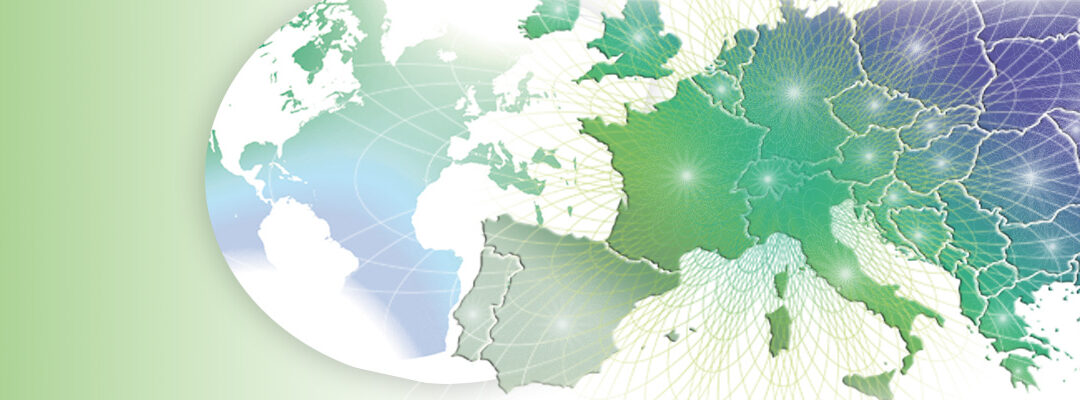
Jun 27, 2016 | Focolare Worldwide
 The outcome of the recent British referendum is one of the many symptoms of a fragmented Europe. It confirms that functional measures are not enough to convince about a common membership. This crisis calls for reflection and bold proposals. It is the right time for the Together for Europe edition, a clear, public manifestation of efforts for the renewal of the continent. It will take place in Munich from June 30 to July 2, 2016 Those familiar with Together for Europe know that this is not an event but a process towards unity in diversity that started in 1999. It involves a growing number of Movements and Communities – to date more than 300 – a confident minority, that comes from various Churches in different European countries. Through encounter and reconciliation, this process has produced its effects: communities and movements experience encounter and discover complementary; mutual trust brings change. Programme. On June 30 and July 1, 1500 leaders and collaborators will take part in a congress held at the Circus-Krone-Bau. Apart from plenary sessions, the programme consists of 36 forums and round tables. Cardinal Peter Turkson is expected to be one of the main participants. An outdoor rally, open to the public, will take place on July 2 at the central Karlsplatz (Stachus) in Munich. Olav Fykse Tveit, General Secretary of the World Council of Churches, the Catholic Cardinals Kurt Koch and Reinhard Marx, the Evangelical Bishops Frank Otfried July and Heinrich Bedford-Strohm, the Orthodox Metropolitan Serafim Joanta are among the main speakers representing the different Churches, while Maria Voce (Focolare Movement), Gerhard Pross (YMCA Esslingen), Andrea Riccardi (Sant’Egidio), Michelle Moran (ICCRS), Walter Heidenreich (FCJG Lüdenscheid) and P. Heinrich Walter (Schoenstatt Movement) will be the speakers that come from the Movements and Communities. Youth have been offering their active, convinced and creative contribution towards this programme. Pope Francis and the Ecumenical Patriarch Bartholomew I will be present through their video messages. The programme can be followed in 7 languages through a streaming broadcast (www.together4europe.org). Topics on the agenda include integration and reconciliation, solidarity with the weakest, sustainability and environment protection, Christians and Muslims in dialogue, marriage and family and economy. These are meant to stimulate a responsibility that goes beyond Europe, because the continent “has an experience of two thousand years of Christianity with ideas, culture, life and actions that can be offer as a service to today’s world, but unfortunately this has not been recognized yet” – Maria Voce says. Munich’s edition of Together for Europe is backed up by solid moments of reflection, discussions, sharing of views and experiences. Of significant importance is the conference entitled “Europe, what identity, what values”, organized by the World Council of Churches and the Focolare Movement. During this conference, held in Geneva on April 21 of this year, Pasquale Ferrara, a diplomat and a university professor claimed that today Europe needs to generate “fruits of Christianity”, rather than speak about its Christian roots. He also said that we need to present “the ‘golden rule’, which invites us to do to others what we would like others to do unto us” because such a rule “is not only of ethical value, but it also assumes a political dimension, as it makes one reflect about the nature and character of the political community”. Together for Europe seems capable to interpret this dimension while it inspires and motivates people of different generations and communities from countries across Europe to incarnate the values of justice, encounter, reconciliation and peace in their everyday life. Thus it contributes towards building “a Europe of leadership”, as described by Pope Francis when he visited the European Parliament in November 2014 and spoke of “a Europe which contemplates the heavens and pursues lofty ideals, which cares for, defends and protects every man and woman, which bestrides the earth surely and securely; a precious point of reference for all humanity”. The Munich event is under the patronage of UNESCO, the Council of Europe, the European Parliament and the European Commission. Source: Press Release – June 27, 2016
The outcome of the recent British referendum is one of the many symptoms of a fragmented Europe. It confirms that functional measures are not enough to convince about a common membership. This crisis calls for reflection and bold proposals. It is the right time for the Together for Europe edition, a clear, public manifestation of efforts for the renewal of the continent. It will take place in Munich from June 30 to July 2, 2016 Those familiar with Together for Europe know that this is not an event but a process towards unity in diversity that started in 1999. It involves a growing number of Movements and Communities – to date more than 300 – a confident minority, that comes from various Churches in different European countries. Through encounter and reconciliation, this process has produced its effects: communities and movements experience encounter and discover complementary; mutual trust brings change. Programme. On June 30 and July 1, 1500 leaders and collaborators will take part in a congress held at the Circus-Krone-Bau. Apart from plenary sessions, the programme consists of 36 forums and round tables. Cardinal Peter Turkson is expected to be one of the main participants. An outdoor rally, open to the public, will take place on July 2 at the central Karlsplatz (Stachus) in Munich. Olav Fykse Tveit, General Secretary of the World Council of Churches, the Catholic Cardinals Kurt Koch and Reinhard Marx, the Evangelical Bishops Frank Otfried July and Heinrich Bedford-Strohm, the Orthodox Metropolitan Serafim Joanta are among the main speakers representing the different Churches, while Maria Voce (Focolare Movement), Gerhard Pross (YMCA Esslingen), Andrea Riccardi (Sant’Egidio), Michelle Moran (ICCRS), Walter Heidenreich (FCJG Lüdenscheid) and P. Heinrich Walter (Schoenstatt Movement) will be the speakers that come from the Movements and Communities. Youth have been offering their active, convinced and creative contribution towards this programme. Pope Francis and the Ecumenical Patriarch Bartholomew I will be present through their video messages. The programme can be followed in 7 languages through a streaming broadcast (www.together4europe.org). Topics on the agenda include integration and reconciliation, solidarity with the weakest, sustainability and environment protection, Christians and Muslims in dialogue, marriage and family and economy. These are meant to stimulate a responsibility that goes beyond Europe, because the continent “has an experience of two thousand years of Christianity with ideas, culture, life and actions that can be offer as a service to today’s world, but unfortunately this has not been recognized yet” – Maria Voce says. Munich’s edition of Together for Europe is backed up by solid moments of reflection, discussions, sharing of views and experiences. Of significant importance is the conference entitled “Europe, what identity, what values”, organized by the World Council of Churches and the Focolare Movement. During this conference, held in Geneva on April 21 of this year, Pasquale Ferrara, a diplomat and a university professor claimed that today Europe needs to generate “fruits of Christianity”, rather than speak about its Christian roots. He also said that we need to present “the ‘golden rule’, which invites us to do to others what we would like others to do unto us” because such a rule “is not only of ethical value, but it also assumes a political dimension, as it makes one reflect about the nature and character of the political community”. Together for Europe seems capable to interpret this dimension while it inspires and motivates people of different generations and communities from countries across Europe to incarnate the values of justice, encounter, reconciliation and peace in their everyday life. Thus it contributes towards building “a Europe of leadership”, as described by Pope Francis when he visited the European Parliament in November 2014 and spoke of “a Europe which contemplates the heavens and pursues lofty ideals, which cares for, defends and protects every man and woman, which bestrides the earth surely and securely; a precious point of reference for all humanity”. The Munich event is under the patronage of UNESCO, the Council of Europe, the European Parliament and the European Commission. Source: Press Release – June 27, 2016
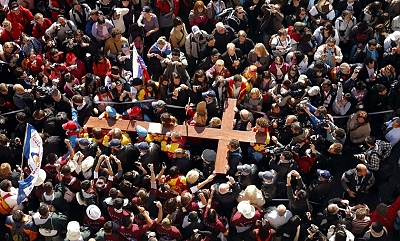
Jun 26, 2016 | Non categorizzato
 Jesus Forsaken Highest Expression of the Father’s Mercy Jesus Christ reveals the true face of God (see MV, 1), the image of the Father, his expression, his glory, his beauty, the beauty of his love (see Jn 14:8-9). By accomplishing the Pasqual Mystery, Jesus conquers suffering, sin and death, and transforms everything into mercy (see Rm 5:20). God became man to love,” Chiara Lubich says, “not only with Divine Love, but also with Suffering. He took upon Himself “all the sufferings of the world, all the disunity of the universe and made it all: Love, God!” Co vered in our sins, He renders the suffering, love; He translates misery into Mercy (misericordia).” In a letter from 1945 Chiara admits: “I also fall, often, always. But when I lift my gaze to Him and see Him there, incapable of revenge, since He is nailed to the cross because of His boundless love, I let myself be caressed by His Infinite Mercy and I know it’s the only thing that must win out in me. What good would it do Him to be infinitely Merciful? What good would it do Him if it were not for our sins?” And with abandon Chiara exclaims: “I would like to bear witness to the world that Jesus Forsaken has filled every void, enlightened every darkness, accompanied every loneliness, annulled every suffering and cancelled every sin.” These are a few cardinal points of Chiara Lubich’s in a nutshell seen from the standpoint of mercy which this Holy Year invites us to consider. We can’t end without a brief mention of Mary, Mother of Mercy and Mother of the Work founded by Chiara and named by her “Work of Mary”. Chiara writes: “A mother never stops loving the son when he’s bad, she never stops waiting for him if he’s far away, she never desires anything but to find him again, forgive him, take him into her arms – because a mother’s love is scented with mercy. (…) A mother’s love is by its very nature stronger than death. (…) Well, then, if this is what the love of ordinary mothers is like, imagine what the love of Mary is like, the human-Divine Mother of a boy who was God, and spiritual Mother us all ! (…) But God deposited his whole design for humanity in Mary (see Lk 1:49): In Mary he reveals all of his Mercy for humanity.” Source: Centro Chiara Lubich Part One: Mercy in the Spirituality of Chiara Lubich Part Two: Chiara Lubich: Love of Neighbour & the Works of Mercy Complete text by Alba Sgariglia (Italian)
Jesus Forsaken Highest Expression of the Father’s Mercy Jesus Christ reveals the true face of God (see MV, 1), the image of the Father, his expression, his glory, his beauty, the beauty of his love (see Jn 14:8-9). By accomplishing the Pasqual Mystery, Jesus conquers suffering, sin and death, and transforms everything into mercy (see Rm 5:20). God became man to love,” Chiara Lubich says, “not only with Divine Love, but also with Suffering. He took upon Himself “all the sufferings of the world, all the disunity of the universe and made it all: Love, God!” Co vered in our sins, He renders the suffering, love; He translates misery into Mercy (misericordia).” In a letter from 1945 Chiara admits: “I also fall, often, always. But when I lift my gaze to Him and see Him there, incapable of revenge, since He is nailed to the cross because of His boundless love, I let myself be caressed by His Infinite Mercy and I know it’s the only thing that must win out in me. What good would it do Him to be infinitely Merciful? What good would it do Him if it were not for our sins?” And with abandon Chiara exclaims: “I would like to bear witness to the world that Jesus Forsaken has filled every void, enlightened every darkness, accompanied every loneliness, annulled every suffering and cancelled every sin.” These are a few cardinal points of Chiara Lubich’s in a nutshell seen from the standpoint of mercy which this Holy Year invites us to consider. We can’t end without a brief mention of Mary, Mother of Mercy and Mother of the Work founded by Chiara and named by her “Work of Mary”. Chiara writes: “A mother never stops loving the son when he’s bad, she never stops waiting for him if he’s far away, she never desires anything but to find him again, forgive him, take him into her arms – because a mother’s love is scented with mercy. (…) A mother’s love is by its very nature stronger than death. (…) Well, then, if this is what the love of ordinary mothers is like, imagine what the love of Mary is like, the human-Divine Mother of a boy who was God, and spiritual Mother us all ! (…) But God deposited his whole design for humanity in Mary (see Lk 1:49): In Mary he reveals all of his Mercy for humanity.” Source: Centro Chiara Lubich Part One: Mercy in the Spirituality of Chiara Lubich Part Two: Chiara Lubich: Love of Neighbour & the Works of Mercy Complete text by Alba Sgariglia (Italian)
Jun 25, 2016 | Focolare Worldwide

Jun 24, 2016 | Focolare Worldwide
 “Here I learned how to dialogue with my children, and I shall surely return to know more,” remarked one of the mothers dressed in a sari. One of the fathers said, “I have decided to dedicate more time for my children.” The comments came from two of the 60 participants attending the course on parenting held at Udisha, which was entitled: “Children – the future of our nation”. After school, in the same facilities, their children are given a snack, toys and after-school activities. For some of the parents, the themes dealt with were a surprising novelty, while for others they were eye-openers to their own mistakes and the dangers and risks to which their children are exposed. But the course was not the only a promotion addressing the parents.
“Here I learned how to dialogue with my children, and I shall surely return to know more,” remarked one of the mothers dressed in a sari. One of the fathers said, “I have decided to dedicate more time for my children.” The comments came from two of the 60 participants attending the course on parenting held at Udisha, which was entitled: “Children – the future of our nation”. After school, in the same facilities, their children are given a snack, toys and after-school activities. For some of the parents, the themes dealt with were a surprising novelty, while for others they were eye-openers to their own mistakes and the dangers and risks to which their children are exposed. But the course was not the only a promotion addressing the parents. 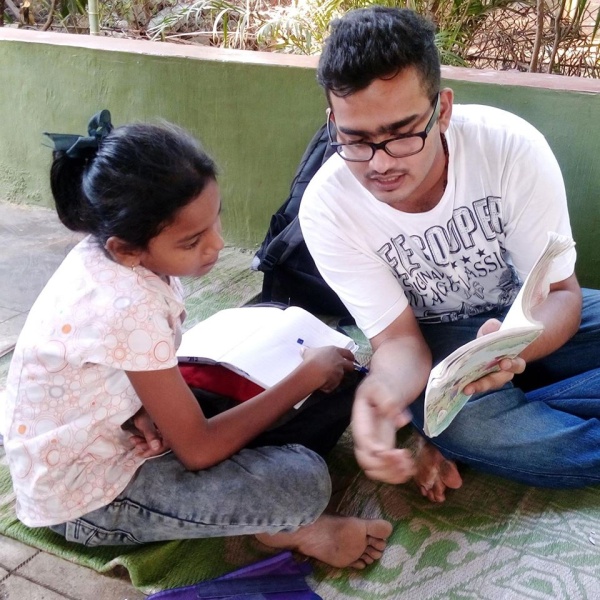 In this 5th year of Udisha – one of the social projects of the Focolare for disadvantaged children, teens and families – there is also the opportunity to obtain a microcredit, thanks to which the economy of many families has decisively improved. Especially the women have gained access to an initial subsidy and many have been able to open small handicraft or business activities such as the production of crochet bags or selling cooked food. Already 52 mothers hold monthly group meetings to share their entrepreneurial experiences and solve some common problems together. Other successful activities this year was the prophylaxis against typhus, which was beneficial to 107 children and adults, and 72 adults and 95 kids were vaccinated against German measles. But the greatest efforts of the project addressed the kids who were involved in new activities. Independence Day on 15 August was celebrated with the flag-raising ceremony, accompanied by patriotic songs and poems. In September instead, on the occasion of the Bandra fair – one of the city’s most important events – children and parents had a field trip to the Mount Mary Basilica. Also in September, India celebrated teachers’ day and the children once again thanked their educators with a song, dance and theater performance.
In this 5th year of Udisha – one of the social projects of the Focolare for disadvantaged children, teens and families – there is also the opportunity to obtain a microcredit, thanks to which the economy of many families has decisively improved. Especially the women have gained access to an initial subsidy and many have been able to open small handicraft or business activities such as the production of crochet bags or selling cooked food. Already 52 mothers hold monthly group meetings to share their entrepreneurial experiences and solve some common problems together. Other successful activities this year was the prophylaxis against typhus, which was beneficial to 107 children and adults, and 72 adults and 95 kids were vaccinated against German measles. But the greatest efforts of the project addressed the kids who were involved in new activities. Independence Day on 15 August was celebrated with the flag-raising ceremony, accompanied by patriotic songs and poems. In September instead, on the occasion of the Bandra fair – one of the city’s most important events – children and parents had a field trip to the Mount Mary Basilica. Also in September, India celebrated teachers’ day and the children once again thanked their educators with a song, dance and theater performance.  On 2 October, feast of the father of the nation – Mahatma Gandhi – the celebration started with the thoughts of Gandhi on nonviolence and peace, and reflections on the poverty of many children living on the streets and the importance of sharing. Despite their extreme poverty, also the Udisha children wanted to share the little they had: some clothing item, a small toy, or some sweets. And discussing among themselves, they also listed many other things to share: their ideas, joy, and smiles. The Diwali (Feast of Light) is India’s most important feast that takes place for four days between October and November every year – during which the children of Udisha used all their creativity in painting terracotta vases and drawing pictures with coloured powder. It was their way of contributing to the project, mostly through a distance-financing from a nonprofit AFN organization. The intensity with which the children of Udisha absorb the “culture of giving” is really impressive. This inspiring idea is the core of the project and education they receive, and a value that is conveyed to them not only through words but through the concrete love of the volunteers onsite, and those across the ocean, whom they have never met but who care for them.
On 2 October, feast of the father of the nation – Mahatma Gandhi – the celebration started with the thoughts of Gandhi on nonviolence and peace, and reflections on the poverty of many children living on the streets and the importance of sharing. Despite their extreme poverty, also the Udisha children wanted to share the little they had: some clothing item, a small toy, or some sweets. And discussing among themselves, they also listed many other things to share: their ideas, joy, and smiles. The Diwali (Feast of Light) is India’s most important feast that takes place for four days between October and November every year – during which the children of Udisha used all their creativity in painting terracotta vases and drawing pictures with coloured powder. It was their way of contributing to the project, mostly through a distance-financing from a nonprofit AFN organization. The intensity with which the children of Udisha absorb the “culture of giving” is really impressive. This inspiring idea is the core of the project and education they receive, and a value that is conveyed to them not only through words but through the concrete love of the volunteers onsite, and those across the ocean, whom they have never met but who care for them.

Jun 23, 2016 | Focolare Worldwide
 Nearly two months have gone by since Ecuador was hit by a disastrous earthquake. The Focolare Movement immediately began a fundraising effort to meet requests for basic necessities, and it set up a work group coordinated by the United World Association and the New Families NPO Association. The generous support of people from around the world arrived quickly, and we have now ready to send the first funds that will provide people of Ecuador with such things as food, sanitation and psychological support. This assistance will be directed especially to families from the Provinces of Manabi and Espmeraldes, which suffered the most damage. In partnership with the local NGO, Fondo Ecuatoriano Populorum Progressio (FEPP), the first six-month phase will focus on studying the reconstruction of infrastructure and returning local production. The study will work in collaboration with the international network of architects known as “Arquitecturalimite” which specializes in designing services in contexts where there is socio-economic exclusion. On November 9 – 13, 2016, while a course on peace is being offered to young people, a series of architectural workshops will be taking place to deal with possible responses to the earthquake disaster. How you can help Source: AMU – AFN Onlus
Nearly two months have gone by since Ecuador was hit by a disastrous earthquake. The Focolare Movement immediately began a fundraising effort to meet requests for basic necessities, and it set up a work group coordinated by the United World Association and the New Families NPO Association. The generous support of people from around the world arrived quickly, and we have now ready to send the first funds that will provide people of Ecuador with such things as food, sanitation and psychological support. This assistance will be directed especially to families from the Provinces of Manabi and Espmeraldes, which suffered the most damage. In partnership with the local NGO, Fondo Ecuatoriano Populorum Progressio (FEPP), the first six-month phase will focus on studying the reconstruction of infrastructure and returning local production. The study will work in collaboration with the international network of architects known as “Arquitecturalimite” which specializes in designing services in contexts where there is socio-economic exclusion. On November 9 – 13, 2016, while a course on peace is being offered to young people, a series of architectural workshops will be taking place to deal with possible responses to the earthquake disaster. How you can help Source: AMU – AFN Onlus
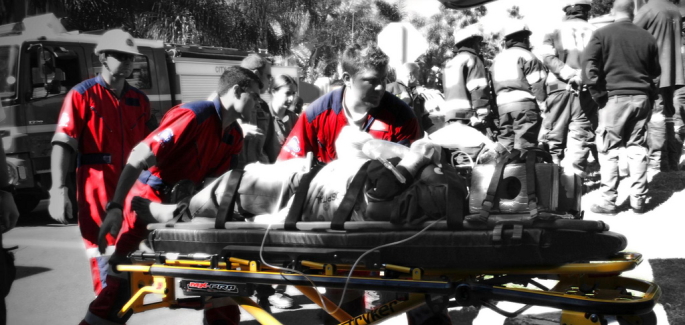
Jun 22, 2016 | Non categorizzato
 To New Life I’m a doctor working in emergency services. One morning I got called to help an elderly man who wasn’t feeling well. He was living in the midst of a lot of disorder, crushed by the death of his only son under mysterious circumstances. When I looked at his documents I realized that during the Communist Regime he had done a lot of evil things to people. I put aside all my judgements and tried to help that suffering man in front of me who was in need of affection. Beyond it all, now, for me, he was a neighbour that Jesus was inviting me to love. He spoke to me often of his past whenever I went to visit him at the hospital. Sometimes it was hard for me to listen to him, but when I was able to tell him about my own faith, I saw hope switch on in the man: It was as if he was being born to new life.” M. U. (Czech Republic) The Contract “I’m in charge of sales at the business I work for. We were competing for the contract with a major supplier and we had all the credentials to get it: design, price appeal . . . But to get the contract we would have to pay a bribe. Another Christian and I decided not to continue with the deal even at the cost of losing a significant percentage of that month’s sales. But the following month sales exceeded projections and covered the previous deficits. For us it seemed like a confirmation that it always pays to trust God. J. P. (Panama) The Translation “I had to finish a translation before the end of the evening. It was to be used for one of the presentations at a conference. Then, the telephone rang. It was a friend telling me that he needed my help right away, and it was urgent. I assured him I would help him. Only that when I received the text of the letter he wanted me to work on, I saw that there were certain technical terms that turned out to be difficult for me to translate. Only with the help of internet and several telephone calls to specialists in his field was I able to finish the translation for him, even though it was at the cost of my own work. Still, I was at peace for having helped my friend. At that point, I telephoned the association that had assigned me the translation, to explain that I would send it them on the day after, thinking that I could stay up all night and work on it. But they replied: “You can sleep soundly. That presentation has been postponed.” T. M. (Slovak Republic)
To New Life I’m a doctor working in emergency services. One morning I got called to help an elderly man who wasn’t feeling well. He was living in the midst of a lot of disorder, crushed by the death of his only son under mysterious circumstances. When I looked at his documents I realized that during the Communist Regime he had done a lot of evil things to people. I put aside all my judgements and tried to help that suffering man in front of me who was in need of affection. Beyond it all, now, for me, he was a neighbour that Jesus was inviting me to love. He spoke to me often of his past whenever I went to visit him at the hospital. Sometimes it was hard for me to listen to him, but when I was able to tell him about my own faith, I saw hope switch on in the man: It was as if he was being born to new life.” M. U. (Czech Republic) The Contract “I’m in charge of sales at the business I work for. We were competing for the contract with a major supplier and we had all the credentials to get it: design, price appeal . . . But to get the contract we would have to pay a bribe. Another Christian and I decided not to continue with the deal even at the cost of losing a significant percentage of that month’s sales. But the following month sales exceeded projections and covered the previous deficits. For us it seemed like a confirmation that it always pays to trust God. J. P. (Panama) The Translation “I had to finish a translation before the end of the evening. It was to be used for one of the presentations at a conference. Then, the telephone rang. It was a friend telling me that he needed my help right away, and it was urgent. I assured him I would help him. Only that when I received the text of the letter he wanted me to work on, I saw that there were certain technical terms that turned out to be difficult for me to translate. Only with the help of internet and several telephone calls to specialists in his field was I able to finish the translation for him, even though it was at the cost of my own work. Still, I was at peace for having helped my friend. At that point, I telephoned the association that had assigned me the translation, to explain that I would send it them on the day after, thinking that I could stay up all night and work on it. But they replied: “You can sleep soundly. That presentation has been postponed.” T. M. (Slovak Republic)

Jun 21, 2016 | Non categorizzato
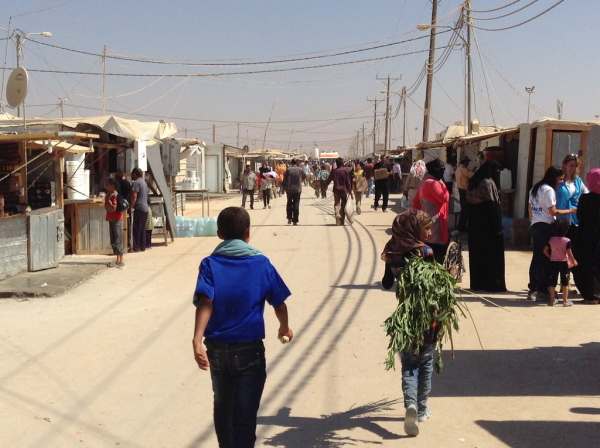
Refugee camp, Jordan. Photo credit: Flickr
 HOST SPOT is financed by the European Community Erasmus +. The name plays on the European notion of a ‘hot spot’ as a point of arrival where refugees can be welcomed. The word “SPOT” stands for the short commercial-like television or radio spots that will be part of major television and radio programming, and the production of a major video. After Jordan, a training course is planned for Turkey in October 2016. It will offer training in journalism and storytelling for the promotion of human rights and, in particular, freedom of expression. A further course will be held in Germany in March 2017 for developing basic technical production skills for social documentaries with live filming. There will be opportunities to meet the refugees in the German refugee camps and compare different approaches and systems for welcoming them. The project that underscores encounter and reciprocity hopes to document and film the personal stories and daily life of refugees in the camps, providing the public with more information for understanding the refugees, and for informing their conscience. Info: info@new-humanity.org Maria Chiara De Lorenzo
HOST SPOT is financed by the European Community Erasmus +. The name plays on the European notion of a ‘hot spot’ as a point of arrival where refugees can be welcomed. The word “SPOT” stands for the short commercial-like television or radio spots that will be part of major television and radio programming, and the production of a major video. After Jordan, a training course is planned for Turkey in October 2016. It will offer training in journalism and storytelling for the promotion of human rights and, in particular, freedom of expression. A further course will be held in Germany in March 2017 for developing basic technical production skills for social documentaries with live filming. There will be opportunities to meet the refugees in the German refugee camps and compare different approaches and systems for welcoming them. The project that underscores encounter and reciprocity hopes to document and film the personal stories and daily life of refugees in the camps, providing the public with more information for understanding the refugees, and for informing their conscience. Info: info@new-humanity.org Maria Chiara De Lorenzo
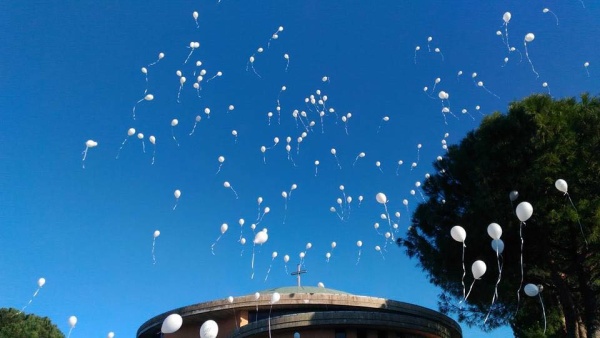
Jun 20, 2016 | Focolare Worldwide
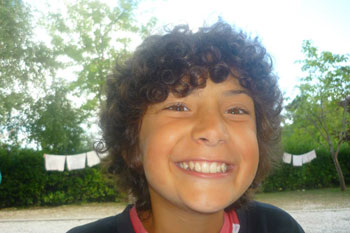 The moment news of his illness spread, the friends of Andrea, together with the boys and adults of Appignano started to join forces with the family in the small chapel of Madonna Addolorata. Every time the number grew and intensified their prayers for the healing of Andrea. As his hospitalization extended, they asked with faith that also Andrea’s family would find strength and peace, and that Andrea would never feel alone, even when he had to face checkups and treatments and would not suffer excessively. Precisely this year his class was preparing the children and their parents for the first communion, and all together decided to postpone the event to next year, to allow Andrea to receive the sacrament with all of them.
The moment news of his illness spread, the friends of Andrea, together with the boys and adults of Appignano started to join forces with the family in the small chapel of Madonna Addolorata. Every time the number grew and intensified their prayers for the healing of Andrea. As his hospitalization extended, they asked with faith that also Andrea’s family would find strength and peace, and that Andrea would never feel alone, even when he had to face checkups and treatments and would not suffer excessively. Precisely this year his class was preparing the children and their parents for the first communion, and all together decided to postpone the event to next year, to allow Andrea to receive the sacrament with all of them. 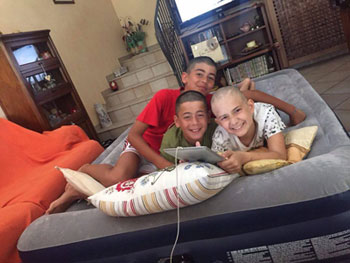 Finally Andrew returned home, and his friends, knowing that his hair had fallen due to the therapy, decided to cut their hair short to welcome him back. Meantime, Andrea, like a real trooper of serenity continued the treatments, without losing his wonderful smile. After two years, Andrea seemed to have been healed, so much so that he was able to participate in the summer training course, and subsequently, in the weekly meetings of the Diocesan Movement of the Focolare.
Finally Andrew returned home, and his friends, knowing that his hair had fallen due to the therapy, decided to cut their hair short to welcome him back. Meantime, Andrea, like a real trooper of serenity continued the treatments, without losing his wonderful smile. After two years, Andrea seemed to have been healed, so much so that he was able to participate in the summer training course, and subsequently, in the weekly meetings of the Diocesan Movement of the Focolare. 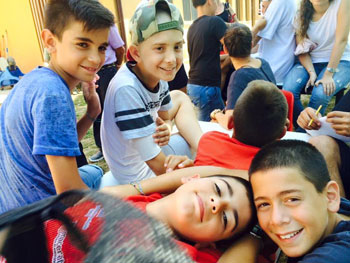 Something new came up in 2016: the checkups revealed the need for a new round of treatments and which also this time seemed to give positive results. But precisely upon returning home from a Gen3 meeting, a serious crisis forced him to an urgent hospitalisation. Something indescribable then happened in Appignano. Thrice a week his classmates and all those of the School, together with the young friends of Federica, his sister and the many people closet o the family, started to fill the crape of Addolorata. The kids themselves led the prayers, in an amazing spiritual atmosphere of faith in God who is Love, certain that all He sent or allows to happen, always leads to the Good. A certainty that, even when Andrea, at the age of 13 left this earthly existence, his presence in the community of Appignano has never diminished. For two days there was an uninterrupted pilgrimage of kids and adults to the Addolorata chapel where – where Andrew lay – to gather round the family with wake shifts so that he was never left alone. At the funeral celebrated in the parish, the church could not contain all the people. The celebrant spoke of Andrew as a “trooper” and a “teacher of life” and in recalling the strength with which he faced his illness, underlined with amazement his deep sense of humanity, fraternity and faith which the boy managed to imbue in the entire community. At the end, the children and kids launched hundreds of white balloons in the sky, as a symbol of the certainty that Andrew is now in Heaven and their great support to the family: an event that went viral on the network.
Something new came up in 2016: the checkups revealed the need for a new round of treatments and which also this time seemed to give positive results. But precisely upon returning home from a Gen3 meeting, a serious crisis forced him to an urgent hospitalisation. Something indescribable then happened in Appignano. Thrice a week his classmates and all those of the School, together with the young friends of Federica, his sister and the many people closet o the family, started to fill the crape of Addolorata. The kids themselves led the prayers, in an amazing spiritual atmosphere of faith in God who is Love, certain that all He sent or allows to happen, always leads to the Good. A certainty that, even when Andrea, at the age of 13 left this earthly existence, his presence in the community of Appignano has never diminished. For two days there was an uninterrupted pilgrimage of kids and adults to the Addolorata chapel where – where Andrew lay – to gather round the family with wake shifts so that he was never left alone. At the funeral celebrated in the parish, the church could not contain all the people. The celebrant spoke of Andrew as a “trooper” and a “teacher of life” and in recalling the strength with which he faced his illness, underlined with amazement his deep sense of humanity, fraternity and faith which the boy managed to imbue in the entire community. At the end, the children and kids launched hundreds of white balloons in the sky, as a symbol of the certainty that Andrew is now in Heaven and their great support to the family: an event that went viral on the network.  A labourer, head of a family, observed: “What impresses me most is the great number of people of various nationalities and religions. It is a real lesson also for us adults who often forget that humanity which unites us all. Andrea and his friends are our teachers of life” And a girl wrote “We prayed so hard for a miracle. And the miracle came about: a child was able to unite an entire town around him, and this is something inexpiable.” At the cemetery a girl, upon seeing a woman sobbing, went up to her and said: “Don’t cry. Andrew is now with Jesus.” Two months have passed and the prayer sessions in have continued every Wednesday, “It’s important that we do so,” one of the kids said. “We need to go ahead so that the fruits of the life of Andrew – that’s how I like to consider them– can continue to bear fruit among us.”
A labourer, head of a family, observed: “What impresses me most is the great number of people of various nationalities and religions. It is a real lesson also for us adults who often forget that humanity which unites us all. Andrea and his friends are our teachers of life” And a girl wrote “We prayed so hard for a miracle. And the miracle came about: a child was able to unite an entire town around him, and this is something inexpiable.” At the cemetery a girl, upon seeing a woman sobbing, went up to her and said: “Don’t cry. Andrew is now with Jesus.” Two months have passed and the prayer sessions in have continued every Wednesday, “It’s important that we do so,” one of the kids said. “We need to go ahead so that the fruits of the life of Andrew – that’s how I like to consider them– can continue to bear fruit among us.”
Jun 19, 2016 | Non categorizzato

Jun 19, 2016 | Non categorizzato
 “Ever since the beginning of the Movement, especially because of the sad circumstances of the War, Chiara and her companions were very attentive to the poor of their city, taking them into their house, visiting them, providing them with the basic necessities and assisting them in many other ways. Through this loving exercize toward their neighbours who were in need, they later realized that their heart shouldn’t only be turned towards the poor but towards all people without making any distinctions. (…) Chiara mentions the works of mercy in several letters, which she wrote in those early days to people who had drawn near to the Movement. We present a letter she wrote to her friend Anna, inviting her to live out the works of mercy that God puts before her in every moment of the day. “Remember that at the end of life you’ll be asked for the 7+7 works of Mercy. If you did them, you did everything. And I’d like you to join us in living the present moment and, in the present moment, the work of Mercy that God requires of us. Do you study? = You instruct the ignorant. Do you tutor a classmate? = You counsel the doubting. Do you eat or give food to others? = You feed the hungry. Do you drink or give someone a drink? = You quench the thirst of the thirsty. The 14 Acts of Mercy should determine each of your actions. And each of your actions should be turned towards Jesus who should live and grow in you and in your neighbour. Mutual Love, the Pact of Mercy and Pardon Jesus’s new commandment: “Love one another as I have loved you” (see Jn 13:34), which highlights what is specific about the interpersonal relations of Christians and the ultimate goal of mercy, is another cardinal point of the spirituality of Chiara Lubich. Mutual love lived out with an attitude of being the first to love, of free and unconditional self-giving one to the other, was what characterized the life of the first focolare. Chiara herself described its radicalness, when she spoke to a group of Muslim friends about the Pact of Mercy. (…) On other occasions Chiara reiterated the opportuneness of this practice, underscoring the value of pardoning, and describing it as a real act of freedom: “Pardon. Always pardon. Pardon is forgetting, which often means not wanting to look at reality in the face. Pardon is not weakness, that is, not taking into account a wrong for fear of the stronger one who committed it. Pardon doesn’t consist in carelessly signing on to what is wrong, or in calling good what is evil. Pardon is not indifference. Pardon is a lucid and willful decision, an act of freedom therefore, which consists in welcoming our brothers and sisters as they are, in spite of the wrong they have done, as God welcomes us sinners in spite of our defects. Pardon consists in not responding to an offence with another offence, but in doing as Paul says: ‘Never let yourselves be overcome by evil, but overcome evil with good.’ Pardon consists in opening the possibility of a new relationship with you to anyone who has done you wrong, the possiblity therefore for you and him to begin life again, to have a future in which evil will not have the last word. (…)” Chiara returns to the topic of this relationship that we should have with every brother and sister, specifying the need of starting over: “Perhaps that brother – like all of us – has commited errors, but how does God see him? What really is his condition, the truth of his state? If he’s right before God, God no longer remembers anything, He’s already cancelled everything with His blood. And we, why should we remember? Who is in the wrong in that moment? I who judge, or my brother? Me.” And so I have to move myself to seeing things from God’s eyes, in the truth and accordingly with my brother, because, if for misfortune he is not yet right with the Lord, the warmth of my love, which is Christ in me, would lead him to contrition as the sun heals and absorbs and heals many wounds. Charity is maintatined with the truth and truth is pure mercy, with which we must be clothed from head to toe so that we can call ourselves Christians. Does my brother or sister return to me? I must see him new as if nothing had happened, and begin to live with him again in the unity of Christ like at first, because there is nothing anymore. This trust of mine will keep him from other falls and I too – if I have used this measure with him – will be able to hope that God one day will judge me.” Source: Centro Chiara Lubich Part 1: Mercy in the Spirituality of Chiara Lubich Complete text by Alba Sgariglia (Italian)
“Ever since the beginning of the Movement, especially because of the sad circumstances of the War, Chiara and her companions were very attentive to the poor of their city, taking them into their house, visiting them, providing them with the basic necessities and assisting them in many other ways. Through this loving exercize toward their neighbours who were in need, they later realized that their heart shouldn’t only be turned towards the poor but towards all people without making any distinctions. (…) Chiara mentions the works of mercy in several letters, which she wrote in those early days to people who had drawn near to the Movement. We present a letter she wrote to her friend Anna, inviting her to live out the works of mercy that God puts before her in every moment of the day. “Remember that at the end of life you’ll be asked for the 7+7 works of Mercy. If you did them, you did everything. And I’d like you to join us in living the present moment and, in the present moment, the work of Mercy that God requires of us. Do you study? = You instruct the ignorant. Do you tutor a classmate? = You counsel the doubting. Do you eat or give food to others? = You feed the hungry. Do you drink or give someone a drink? = You quench the thirst of the thirsty. The 14 Acts of Mercy should determine each of your actions. And each of your actions should be turned towards Jesus who should live and grow in you and in your neighbour. Mutual Love, the Pact of Mercy and Pardon Jesus’s new commandment: “Love one another as I have loved you” (see Jn 13:34), which highlights what is specific about the interpersonal relations of Christians and the ultimate goal of mercy, is another cardinal point of the spirituality of Chiara Lubich. Mutual love lived out with an attitude of being the first to love, of free and unconditional self-giving one to the other, was what characterized the life of the first focolare. Chiara herself described its radicalness, when she spoke to a group of Muslim friends about the Pact of Mercy. (…) On other occasions Chiara reiterated the opportuneness of this practice, underscoring the value of pardoning, and describing it as a real act of freedom: “Pardon. Always pardon. Pardon is forgetting, which often means not wanting to look at reality in the face. Pardon is not weakness, that is, not taking into account a wrong for fear of the stronger one who committed it. Pardon doesn’t consist in carelessly signing on to what is wrong, or in calling good what is evil. Pardon is not indifference. Pardon is a lucid and willful decision, an act of freedom therefore, which consists in welcoming our brothers and sisters as they are, in spite of the wrong they have done, as God welcomes us sinners in spite of our defects. Pardon consists in not responding to an offence with another offence, but in doing as Paul says: ‘Never let yourselves be overcome by evil, but overcome evil with good.’ Pardon consists in opening the possibility of a new relationship with you to anyone who has done you wrong, the possiblity therefore for you and him to begin life again, to have a future in which evil will not have the last word. (…)” Chiara returns to the topic of this relationship that we should have with every brother and sister, specifying the need of starting over: “Perhaps that brother – like all of us – has commited errors, but how does God see him? What really is his condition, the truth of his state? If he’s right before God, God no longer remembers anything, He’s already cancelled everything with His blood. And we, why should we remember? Who is in the wrong in that moment? I who judge, or my brother? Me.” And so I have to move myself to seeing things from God’s eyes, in the truth and accordingly with my brother, because, if for misfortune he is not yet right with the Lord, the warmth of my love, which is Christ in me, would lead him to contrition as the sun heals and absorbs and heals many wounds. Charity is maintatined with the truth and truth is pure mercy, with which we must be clothed from head to toe so that we can call ourselves Christians. Does my brother or sister return to me? I must see him new as if nothing had happened, and begin to live with him again in the unity of Christ like at first, because there is nothing anymore. This trust of mine will keep him from other falls and I too – if I have used this measure with him – will be able to hope that God one day will judge me.” Source: Centro Chiara Lubich Part 1: Mercy in the Spirituality of Chiara Lubich Complete text by Alba Sgariglia (Italian)

 The outcome of the recent British referendum is one of the many symptoms of a fragmented Europe. It confirms that functional measures are not enough to convince about a common membership. This crisis calls for reflection and bold proposals. It is the right time for the Together for Europe edition, a clear, public manifestation of efforts for the renewal of the continent. It will take place in Munich from June 30 to July 2, 2016 Those familiar with Together for Europe know that this is not an event but a process towards unity in diversity that started in 1999. It involves a growing number of Movements and Communities – to date more than 300 – a confident minority, that comes from various Churches in different European countries. Through encounter and reconciliation, this process has produced its effects: communities and movements experience encounter and discover complementary; mutual trust brings change. Programme. On June 30 and July 1, 1500 leaders and collaborators will take part in a congress held at the Circus-Krone-Bau. Apart from plenary sessions, the programme consists of 36 forums and round tables. Cardinal Peter Turkson is expected to be one of the main participants. An outdoor rally, open to the public, will take place on July 2 at the central Karlsplatz (Stachus) in Munich. Olav Fykse Tveit, General Secretary of the World Council of Churches, the Catholic Cardinals Kurt Koch and Reinhard Marx, the Evangelical Bishops Frank Otfried July and Heinrich Bedford-Strohm, the Orthodox Metropolitan Serafim Joanta are among the main speakers representing the different Churches, while Maria Voce (Focolare Movement), Gerhard Pross (YMCA Esslingen), Andrea Riccardi (Sant’Egidio), Michelle Moran (ICCRS), Walter Heidenreich (FCJG Lüdenscheid) and P. Heinrich Walter (Schoenstatt Movement) will be the speakers that come from the Movements and Communities. Youth have been offering their active, convinced and creative contribution towards this programme. Pope Francis and the Ecumenical Patriarch Bartholomew I will be present through their video messages. The programme can be followed in 7 languages through a streaming broadcast (www.together4europe.org). Topics on the agenda include integration and reconciliation, solidarity with the weakest, sustainability and environment protection, Christians and Muslims in dialogue, marriage and family and economy. These are meant to stimulate a responsibility that goes beyond Europe, because the continent “has an experience of two thousand years of Christianity with ideas, culture, life and actions that can be offer as a service to today’s world, but unfortunately this has not been recognized yet” – Maria Voce says. Munich’s edition of Together for Europe is backed up by solid moments of reflection, discussions, sharing of views and experiences. Of significant importance is the conference entitled “Europe, what identity, what values”, organized by the World Council of Churches and the Focolare Movement. During this conference, held in Geneva on April 21 of this year, Pasquale Ferrara, a diplomat and a university professor claimed that today Europe needs to generate “fruits of Christianity”, rather than speak about its Christian roots. He also said that we need to present “the ‘golden rule’, which invites us to do to others what we would like others to do unto us” because such a rule “is not only of ethical value, but it also assumes a political dimension, as it makes one reflect about the nature and character of the political community”. Together for Europe seems capable to interpret this dimension while it inspires and motivates people of different generations and communities from countries across Europe to incarnate the values of justice, encounter, reconciliation and peace in their everyday life. Thus it contributes towards building “a Europe of leadership”, as described by Pope Francis when he visited the European Parliament in November 2014 and spoke of “a Europe which contemplates the heavens and pursues lofty ideals, which cares for, defends and protects every man and woman, which bestrides the earth surely and securely; a precious point of reference for all humanity”. The Munich event is under the patronage of UNESCO, the Council of Europe, the European Parliament and the European Commission. Source: Press Release – June 27, 2016
The outcome of the recent British referendum is one of the many symptoms of a fragmented Europe. It confirms that functional measures are not enough to convince about a common membership. This crisis calls for reflection and bold proposals. It is the right time for the Together for Europe edition, a clear, public manifestation of efforts for the renewal of the continent. It will take place in Munich from June 30 to July 2, 2016 Those familiar with Together for Europe know that this is not an event but a process towards unity in diversity that started in 1999. It involves a growing number of Movements and Communities – to date more than 300 – a confident minority, that comes from various Churches in different European countries. Through encounter and reconciliation, this process has produced its effects: communities and movements experience encounter and discover complementary; mutual trust brings change. Programme. On June 30 and July 1, 1500 leaders and collaborators will take part in a congress held at the Circus-Krone-Bau. Apart from plenary sessions, the programme consists of 36 forums and round tables. Cardinal Peter Turkson is expected to be one of the main participants. An outdoor rally, open to the public, will take place on July 2 at the central Karlsplatz (Stachus) in Munich. Olav Fykse Tveit, General Secretary of the World Council of Churches, the Catholic Cardinals Kurt Koch and Reinhard Marx, the Evangelical Bishops Frank Otfried July and Heinrich Bedford-Strohm, the Orthodox Metropolitan Serafim Joanta are among the main speakers representing the different Churches, while Maria Voce (Focolare Movement), Gerhard Pross (YMCA Esslingen), Andrea Riccardi (Sant’Egidio), Michelle Moran (ICCRS), Walter Heidenreich (FCJG Lüdenscheid) and P. Heinrich Walter (Schoenstatt Movement) will be the speakers that come from the Movements and Communities. Youth have been offering their active, convinced and creative contribution towards this programme. Pope Francis and the Ecumenical Patriarch Bartholomew I will be present through their video messages. The programme can be followed in 7 languages through a streaming broadcast (www.together4europe.org). Topics on the agenda include integration and reconciliation, solidarity with the weakest, sustainability and environment protection, Christians and Muslims in dialogue, marriage and family and economy. These are meant to stimulate a responsibility that goes beyond Europe, because the continent “has an experience of two thousand years of Christianity with ideas, culture, life and actions that can be offer as a service to today’s world, but unfortunately this has not been recognized yet” – Maria Voce says. Munich’s edition of Together for Europe is backed up by solid moments of reflection, discussions, sharing of views and experiences. Of significant importance is the conference entitled “Europe, what identity, what values”, organized by the World Council of Churches and the Focolare Movement. During this conference, held in Geneva on April 21 of this year, Pasquale Ferrara, a diplomat and a university professor claimed that today Europe needs to generate “fruits of Christianity”, rather than speak about its Christian roots. He also said that we need to present “the ‘golden rule’, which invites us to do to others what we would like others to do unto us” because such a rule “is not only of ethical value, but it also assumes a political dimension, as it makes one reflect about the nature and character of the political community”. Together for Europe seems capable to interpret this dimension while it inspires and motivates people of different generations and communities from countries across Europe to incarnate the values of justice, encounter, reconciliation and peace in their everyday life. Thus it contributes towards building “a Europe of leadership”, as described by Pope Francis when he visited the European Parliament in November 2014 and spoke of “a Europe which contemplates the heavens and pursues lofty ideals, which cares for, defends and protects every man and woman, which bestrides the earth surely and securely; a precious point of reference for all humanity”. The Munich event is under the patronage of UNESCO, the Council of Europe, the European Parliament and the European Commission. Source: Press Release – June 27, 2016












